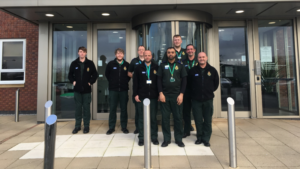The NHS 111 service has increased the number of male mental health first aiders to help prevent suicide amongst men.
The initiative follows on from World Mental Health day back in October.
Known as ‘Manbassadors’, they are employees who have volunteered to offer support to their colleagues.
They have received additional training to spot signs and symptoms for a range of mental health conditions. The team are able to provide support to someone experiencing an issue or crisis, and listen and hold supportive conversations.
There are now 12 Manbassadors within the service.

Darren Parkinson (pictured second from the right), 111 Quality and Assurance Officer, is one of the manbassadors.
He explained why he wanted to become a mental health first aider.
Darren said: “I feel that support for everyone doing a demanding role is pivotal in our organisation.
“It is important to have someone who is approachable, for people to discuss things about work related issues, but also our everyday lives.
Colleagues support one another
“To have someone to listen to you, offer a level of understanding and to share your concerns with, are all important to me especially being a male, as males in their 40s, 50s or 60s are at high risk of suicide.
“It’s so important we look after ourselves and each other.”
Sally Rose, NHS 111 Senior Service Delivery Manager at North West Ambulance Service, said that she is proud of the way the NHS colleagues have come together to be there for one another.
She said: “The NHS as a whole is experiencing a particularly busy and challenging period and in NHS 111, every member of the team is working incredibly hard to provide care and support to members of the public who need us.
“That’s why it’s so important we look after ourselves and each other.”
“Many of us spend most of our day at work, so we all have a real opportunity to spot if a colleague is struggling with their mental health.
“The mental health first aid training gives us the confidence to notice the signs and step in, but I’d encourage anyone to chat to a colleague if they think they might need support.”
In the UK and Ireland, Samaritans can be contacted on 116 123 or email [email protected]









